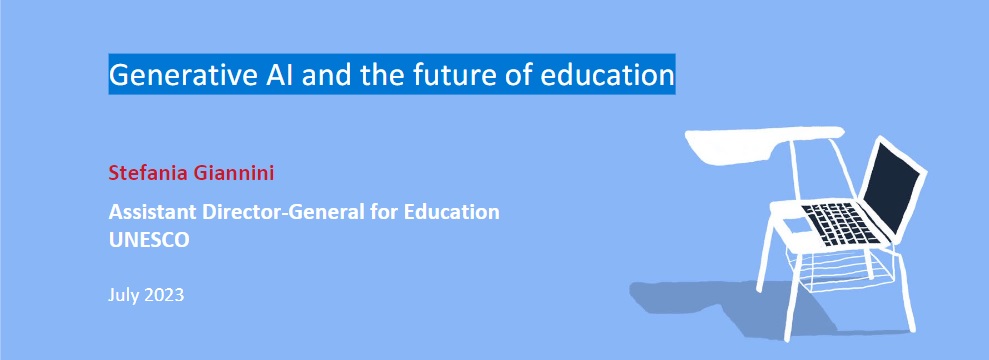العودة

Generative AI and the future of education
اليونسكو
2023 - 07 - 27
Artificial Intelligence (AI) tools are being implemented at an unprecedented scale and pace, which raises important implications for education. In a recent paper, Stefania Giannini, UNESCO Assistant Director-General for Education, examines the potential opportunities and challenges presented by generative AI tools in the context of learning. The publication delves into the profound impact of digital revolutions and explores how generative AI technology can affect education.

Artificial Intelligence (AI) tools are being implemented at an unprecedented scale and pace, which raises important implications for education. In a recent paper, Stefania Giannini, UNESCO Assistant Director-General for Education, examines the potential opportunities and challenges presented by generative AI tools in the context of learning. The publication delves into the profound impact of digital revolutions and explores how generative AI technology can affect education. It highlights concerns regarding the rapid integration of generative AI into educational systems without adequate checks, rules, or regulations. Giannini emphasizes the importance of adopting a cautious approach and urges the education sector to take the lead in evaluating and validating AI applications for educational purposes. She advocates for the establishment of regulatory bodies and the implementation of safety checks, similar to those already in place for other technologies.
The publication underscores the need for AI implementations to bridge educational gaps and promote equal access to quality education for all. It emphasizes the significance of preserving the authority and status of teachers, cautioning against any actions that could undermine their role. Furthermore, it calls for investments in human capabilities alongside the development of AI, recognizing the complementary nature of human expertise and technological advancements in education.
Discover why urgent action is crucial now to ensure the integration of these new technologies according to our terms; https://unesdoc.unesco.org/ark:/48223/pf0000385877
أحدث المنشورات
القائمة الكاملةاليونسكو
المستقبل على المحك: لماذا الاستثمار في التعليم أمر بالغ الأهمية؟
يسلط هذا التقرير، الذي أعدّته اللجنة التوجيهية الرفيعة المستوى المعنية بالهدف الرابع من أهداف التنمية المستدامة (SDG4) بالتعاون مع الشراكة العالمية من أجل التعليم (GPE) ونُشر في عام 2024، الضوء على الحاجة المُلِحّة لتعزيز الاستثمار في التعليم كوسيلة أساسية لمواجهة التحديات العالمية، بما في ذلك تغيّر المناخ، والتطورات التكنولوجية، والتحوّلات الديموغرافية.
اليونسكو
المدن العربية تتألق في جوائز مدن التعلم لليونسكو لعام 2024
تُحرز المدن العربية تقدمًا كبيرًا في مجال التنمية المستدامة والتعلم مدى الحياة، مع تركيز متزايد على إنشاء بيئات تعليمية شاملة تُسهم في تحقيق الأهداف التنموية المحلية والعالمية. وقد احتفلت جوائز مدن التعلم لعام 2024، التي تُمنح من قِبَل اليونسكو، بهذه الجهود، مبرزةً المدن العربية التي تميزت في بناء مجتمعات تعليمية.
اليونسكو
مؤتمر اليونسكو العالمي الثالث للموارد التعليمية المفتوحة: تعزيز الوصول الشامل إلى المعرفة
انطلق مؤتمر اليونسكو العالمي الثالث للموارد التعليمية المفتوحة (OER) في 19 نوفمبر/تشرين الثاني 2024، في مركز دبي التجاري العالمي في دولة الإمارات العربية المتحدة، ليكون المرة الأولى التي يُستضاف فيها هذا الحدث في العالم العربي. نظّم مؤتمر اليونسكو بالتعاون مع مؤسسة محمد بن راشد آل مكتوم للمعرفة (MBRF)واستقطب أكثر من 500 مشارك ومشاركة من نخبة القادة العالميين، وصنّاع السياسات، وممثلي المؤسسات التعليمية، بما في ذلك وزراء، وأكاديميون، وخبراء من القطاع الخاص. وتركّزت المناقشات على مدار يومين حول تعزيز الاستفادة من الموارد التعليمية المفتوحة والتقنيات الناشئة، بهدف تحقيق وصول عادل وشامل إلى التعليم، وتقليص الفجوة الرقمية على الصعيد العالمي.
اليونسكو
الأمم المتحدة تحتفي في شهر ديسمبر/كانون الأول بحقوق الإنسان، والأشخاص ذوي الإعاقة، واللغة العربية
تُحيي الأمم المتحدة في شهر ديسمبر/كانون الأول ثلاث مناسبات بارزة تُعنى بحقوق الإنسان، وبحقوق الأشخاص ذوي الإعاقة، وباللغة العربيّة، ممّا يجعل هذا الشهر فرصةً عالميّةً للتفكير والعمل. وتقود اليونسكو الجهود لتعزيز التعليم الشامل، وحماية حقوق الإنسان، والاحتفاء بالإرث الثقافيّ واللغويّ للّغة العربيّة، من خلال سلسلة من الفعاليات والمبادرات.